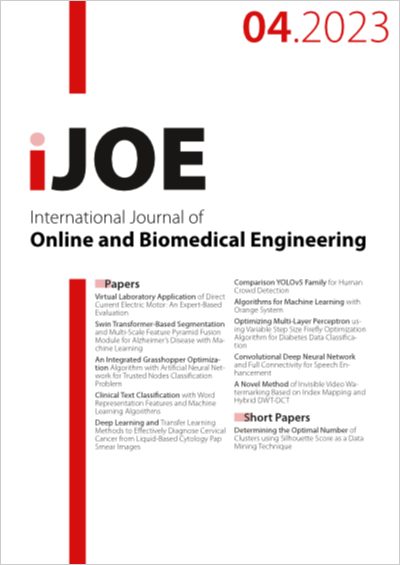Deep Learning and Transfer Learning Methods to Effectively Diagnose Cervical Cancer from Liquid-Based Cytology Pap Smear Images
DOI:
https://doi.org/10.3991/ijoe.v19i04.37437Keywords:
cancer cervical, liquid-based cytology pap smear, deep learning, transfer learning, ResNet50V2, ResNet101V2Abstract
As cervical cancer is considered one of the leading causes of death for women globally, different screening techniques have emerged. As the Papanicolaou technique generates high numbers of false negatives due to only testing 20% of a sample, the liquid-based cytology technique was developed to test 100% of the sample and improve accuracy. However, as the larger sample size has made it difficult to detect the lesion images through a microscope, studies have looked for ways to intelligently analyze sample. The aim of this study is to develop an artificial intelligence image recognition system that detects the lesion level of cervical cancer of liquid-based Pap smears under the Bethesda classification of cancer (NILM/LSIEL/HSIEL/SCC). For this purpose, six activities were carried out: dataset selection, data augmentation, optimization, model development, evaluation and system construction. A dataset built from publicly available Pap smear images and passed through data augmentation algorithms generated a total of 2,676 images. Two models, ResNet50V2 and ResNet101V2, were developed under Deep Learning and Transfer Learning protocols. The evaluation showed that the ResNet50V2 model obtained better performance, where the classification of HSIL and SCC type images obtained a precision of 0.98 and achieved an accuracy of 0.97. Finally, the system based on the ResNet50V2 model was built and its performance was validated.
Downloads
Published
How to Cite
Issue
Section
License
Copyright (c) 2023 Dr. Lenis Wong, Andres Ccopa, Elmer Diaz, MSc. Sergio Valcarcel , Dr. David Mauricio, Vladimir Villoslada

This work is licensed under a Creative Commons Attribution 4.0 International License.



